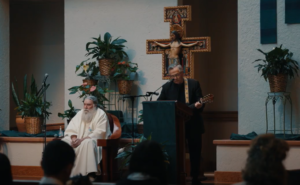For a generation, Catholics from the Archdiocese of Los Angeles have sung, prayed, lit candles, and wept each January during the Requiem for the Unborn.
Offered at the Cathedral of Our Lady of the Angels for two decades, and in parishes before that, the Mass mourns every unborn child killed by abortion during a single day in the greater Los Angeles area. It began as a memorial to one of those children — the son or daughter of its composer, John Bonaduce.
Now 72, Bonaduce is a church musician known for combining traditional and contemporary styles in a way that is both reverent and unabashedly joyful. After an early career in Hollywood, he entered liturgical music fulltime in 1990.
The turning point of his faith journey had come more than a decade earlier when at the age of 26, he paid for his girlfriend to have an abortion.
By that time, he had unthinkingly slipped away from his Catholic roots. It never occurred to him that an abortion took a child’s life. His friends assured him it was the best decision.
When he realized that there had been a child, “my conscience was seared,” he said.
That night he rushed to a church in Santa Monica and pounded on the rectory door. When a priest answered, Bonaduce begged to make a confession then and there.
“He was very good to me,” Bonaduce recalled.
“It was genuine. I had come to it on my own — that this was a bad thing I had invested in. It’s 135 bucks for an abortion to get me out of a jam. A terrible, terrible idea. But embracing it is powerful. And God is your friend on a whole new level after you’ve acquired this level of self-knowledge.”
His return to the Church took three years. He wrote Requiem for the Unborn with support and input from his wife, Eileen.
Some of the musical settings came to him almost instantly, while others took years to compose. It debuted in 1995.
The heart of the Mass — which was offered this year on Jan. 20 — is a candle-lighting ritual. Parishioners in the darkened cathedral carry forward large votive candles, each representing a child who died in an abortion that day in greater Los Angeles.
Two decades ago, there were more than 450 candles. This year there were 120, though part of the reduction is due to increased use of abortion pills that aren’t registered in surgical statistics.
Bonaduce considers those candles the heart of the Requiem.
“That is the power of this piece. It is not the music,” he said.

He wants others like himself, people who bear responsibility for an abortion, to share with him in mourning and repentance — as well as forgiveness and renewal.
“I want them to embrace what we’ve done,” he said. “We’ve sinned on a magnificent scale.”
He believes that music can reach people who have tried to close off communication on this difficult subject.
The use of music for the Requiem means that “I don’t have to explain my opposition to abortion in political or theological terms,” he said.
Katy Kruska, who has sung the Requiem since its debut, has seen its impact.
“People love that music and they come year after year because it is so touching,” said Kruska, the principal at St. Bernardine of Siena School in Woodland Hills, where Bonaduce directs a renowned Sunday evening parish choir.
“It is preaching pro-life and it is against abortion, but in a very quiet, tactful, meaningful prayerful way,” Kruska said. “You’re not just out there with picket signs, but you’re bringing up a candle that symbolizes a loss to abortion that very day. You’re watching that one baby’s life come down the aisle.”
Alicia Laski, who sings and plays bass guitar in Bonaduce’s choir at St. Bernardine, has sung the Requiem for the Unborn since 1996 — as has her mother — and her two adult children have participated as well.
The Requiem carried a special meaning for Laski, who gave up a child for adoption when she was in her mid-teens. She had fallen away from church after confirmation. As a 21-year-old newlywed, she resolved to return and joined the choir at St. Bernadine’s to help her keep that commitment.
“The music of the Requiem really brought out something inside of me,” she said.
“It makes people feel like it’s a relatable subject and they can come forward and get the support or help that they need, whether it’s something happening now or some past trauma. It opens conversations that people are afraid to have.”
That’s because singing “gets the faith inside you,” Bonaduce said. “You don’t have to think about it. You are it.”
Although he is best known for his Requiem for the Unborn, the word he uses to describe his work is “joy.”
“That’s my job description,” he said. “You show kids that you can be an adult man, who’s still alive after seven decades, and you find life joyful. I don’t need much of a mission statement, and that will do it.”
